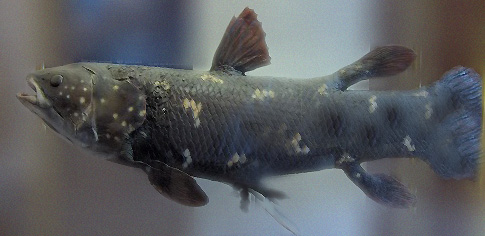Driving my daughter to school in the morning, or on my way to work, everywhere I look, there are fish. I can’t help marveling at them; all those fish in silvery plastic schools. They’re the little plastic chromed fish you see on the tail ends of cars. There are plain fish, and fish that say “Jesus” or probably the same thing in Greek letters, but I don’t read enough Greek to know. There are “Darwin” fish with little legs on the bottom like lobe-fishes and a big fish proclaiming “Truth” eating little Darwin fish. There are still other fish standing upright, spearing the Truth Fish with tiny plastic harpoons. A veritable cosmological arms race is being played out before us with little metallic-colored plastic fish poised only inches away from trunk spaces carrying groceries from the same supermarkets.
There are flags and banners too, proclaiming the various “truths” precious to the people in front of these bumper battlegrounds. This one’s pro-choice, that one’s pro-life. This one thinks that as long as there are tests, there will be prayer in school, and that one kindly offers not to think in your church if you’ll not pray in their kids’ schools. One declares “TRUTH! NOT TOLERANCE!” and but for the little picture of the Bible and the cross, you couldn’t be sure which side they were on. But the battle over Evolution and Creationism is fought mostly by those little fish.
I won’t call it a “War” the way so many debates and struggles are labeled these days. This debate rarely wounds more than anyone’s pride, and the little fish don’t bleed, no matter how harsh their treatment by other fish, or well-aimed shopping carts in supermarket parking lots. But the tone of the debate often makes it seem that way, as if we’re in a desperate struggle for our survival in a total-war. They behave as if the adherents to one cause will at last prove their point beyond a shadow of a doubt with one last witty bumper sticker slogan too sage to refute, and the losers will somehow be as utterly destroyed as old Carthage, the ground salted so that nothing will ever grow in that soil again.
But we know better. The confrontation will never really be that fatalistic, and the debate will never come to so crisp an end. Evolution may take the place of Creationism in the popular imagination, as new knowledge so often displaces the old, but it won’t be the great coup that so many seem to fear. This conflict will have survivors on both sides, and we’re better prepared to handle the new paradigm than we know. The tools of reconstruction are already at hand.
It’s been suggested that some people resist the idea of evolution because they can’t accept the idea of being animals. But this isn’t really the case. We already acknowledge our evolutionary heritage in our daily conversation. After all, we all start out as ankle-biting rug-rats. We quickly grow into little monkeys. My own son learned to climb up the branches of dinning room chairs to forage for snacks on the table before he learned to walk upright, and with my children there’s no shortage of jumping on the bed. As they grow older their mother will regularly complain about how their rooms have turned into pig-sties, and at school field days, we’ll encourage them to run “fast as a race horse.”
As kids get older the animal descriptions grow with them. Some are kinder than others. A boy might one day call my daughter a “fox,” and she’ll probably appreciate it more than I will. I might think of him as a wolf in sheep’s clothing. Many of the names won’t be nice at all; skunk, porker, dog, male or otherwise. The class clown might be a real ham, who later in life will regret taunting that slightly overweight girl by calling her a cow, especially in college when he sees her again and finds out she was just a late bloomer, and she really did blossom, but by then, he’ll be too chicken to offer her an apology, let alone ask her on a date.
As we mature, we climb the evolutionary ladder just a bit, to become gangly apes, and if we’re lucky, Neanderthals. I’ve known two “Yetis” myself, much more at home with their animal monikers in adulthood than they probably were then they acquired them in their late teens. The modern cave man, reputedly obsessed with beer and football, and bereft of manners is the unremarkable resident of suburbs everywhere. And in a bit of what may be purposeful irony, proponents of Evolution often cite the brutish and superstitious picture of our hominid ancestry as the root cause of their Creationist opposition.
Perhaps Creationists fear that the end of creationism will mean the end of Gods and religious teachings. But this isn’t so either. Our culture is full of religious figures, icons and stories from religions that are out of style, and nothing more dramatic will happen with the religions of today. Many school children know the names of Zeus and Hera, Jupiter and Mars, and even the Mighty Thor. High school cheerleaders still invoke the name of Egyptian Gods in the name of the Home Team, “Ra! Ra! Ra!” OK, I’ll admit that’s probably a complete coincidence, but you understood the joke.
But God, Buddha, Jesus, Mohamed the Angels and others will probably enjoy a bigger role in our minds and culture than those relegated to the pages of mythology in earlier centuries. We’ll still see them more often than Santa Claus or the Easter Bunny, and they’ll probably continue to be better known than Socrates or Plato. The characters and stories are too well-known, and too comforting to be forgotten. The ancient texts are too full of fodder for creatures that enjoy metaphor as much as we do. Playgrounds will never run short of David and Goliath confrontations, and there are too many serpents offering forbidden fruit to let such stories go.
In all probability, the end of this controversy will probably be nothing more than the beginning of some other. The apes will finally become adults, and they’ll find they care about different things. When a friend asks about the little fish on the back of their old college beater-cars, they’ll say “Oh, I got the car from mom and dad. That was on there when they gave it to me.” And we’ll find the traces of both Evolution and Creationism are no easier to remove than peeling bumper stickers from an old car.





